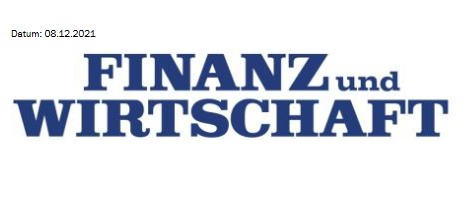Tag Archive: Contributions
The SNB’s Financial Result, Currency Reserves, and Distribution Reserve
How are SNB profits and losses distributed and what issues are debated? Annual Result Funds two “Reserves” The annual result (Jahresergebnis) of the Swiss National Bank (SNB) is split into two parts.
Read More »
Read More »
“Digitales Notenbankgeld – und nun? (CBDC—What Next?),” FuW, 2021
I draw some conclusions from the CEPR eBook on CBDC, namely: Banks will change, whatever happens to CBDC. The main risk of retail CBDC is not bank disintermediation. CBDC may not be the best option even if it has net benefits. It should be for parliaments and voters, not central banks, to decide about the introduction of CBDC.
Read More »
Read More »
“Die Nationalbank ist an vielen Fronten gefordert (Challenges for the Swiss National Bank),” NZZ, 2021
Should the SNB follow the Fed and the ECB and rework its strategy? There is a case for rethinking the broad inflation target, the monetary policy concept, and the communication strategy. Equally important is a strategy review outside of the SNB: The SNB cannot and must not decide about the framework within which it operates.
Read More »
Read More »
“Die Schattenseiten von Schuldenbremsen (The Dark Side of Debt Limits),” ifoSD, 2021
Was Schuldengrenzen aus politökonomischer Sicht besonders attraktiv erscheinen lässt – ihre vermeintliche Einfachheit und Klarheit – birgt also auch Risiken. Es führt dazu, dass Politiker und ihre Wähler die Solidität der Staatsfinanzen über Gebühr an expliziten Bruttoschulden messen.
Read More »
Read More »
“Dirk Niepelt im swissinfo.ch-Gespräch (Interview with Dirk Niepelt),” swissinfo, 2020
Swissinfo, December 14, 2020. HTML, podcast.
We talk about CBDC, the Swiss National Bank, whether CBDC would render it easier to implement helicopter drops, and how central bank profits should be distributed.
Read More »
Read More »
“Unabhängigkeit der Nationalbank (Independence of the SNB),” FuW, 2020
Von verschiedenen Seiten werden Ansprüche an den Gewinn der Nationalbank gestellt. Es sollte in der Kompetenz der SNB liegen, zu entscheiden, welchen Teil ihrer Bilanz sie nicht zur Erfüllung ihrer Aufgaben benötigt.
Read More »
Read More »
“Monetäre Staatsfinanzierung mit Folgen (Monetary Financing of Government),” Die Volkswirtschaft, 2020
Die Volkswirtschaft, 24 July 2020. PDF. Clarifying the connections between outright monetary financing, QE, the distribution of seignorage profits, the relationship between fiscal and monetary policy, and central bank independence.
Read More »
Read More »
“Wenn die Notenbank den Staat finanziert (When the Central Bank Finances the State),” FAS, 2020
Monetary deficit financing is the norm—after all, central banks distribute their profits. Monetary financing occurs in the context of regular open market operations and QE and, hyper charged, with helicopter drops. The question is not whether monetary policy should finance the government, but why it does so, and to what extent. Fiscal and monetary policy are inherently connected; what constitutes monetary policy is defined by objectives.
Read More »
Read More »
“Vollgeld – Was spricht dagegen? (Sovereign Money—What are the Problems?),” RABE, 2018
Die Vollgeld-Initiative will die Schweizer Geldpolitik komplett umkrempeln. Künftig soll nur noch die Nationalbank Geld herstellen dürfen, sowohl Banknoten und Münzen als auch das elektronische Geld. Die Schweizer Geschäftsbanken wie die UBS oder die CS, die heute 90% des elektronischen Geldes herstellen, soll das künftig verboten sein.
Read More »
Read More »
“Was Vollgeld bringt – und was nicht (Sovereign Money—Pluses and Minuses),” SRF, 2018
Wer soll Franken herstellen dürfen? Nur die Schweizerische Nationalbank, oder auch die Geschäftsbanken wie UBS, CS oder die Kantonalbanken? Ginge es nach der Vollgeld-Initiative, über die wir am 10. Juni abstimmen, wäre künftig klar: Geld als gesetzliches Zahlungsmittel gäbe es nur von der SNB.
Read More »
Read More »
Elektronisches Zentralbankengeld hat Vorteile
Die Schweizerische Nationalbank hat dem E-Franken eine Absage erteilt – zu Unrecht, sagt Dirk Niepelt im Interview mit finews.ch. Der Direktor des SNB-nahen Studienzentrums Gerzensee erklärt, warum digitales Geld Vorteile bringt. Vergangene Woche hat sich Andréa Mächler, Mitglied des dreiköpfigen Direktoriums der Schweizerischen Nationalbank (SNB), kritisch zur Einführung eines elektronischen Frankens durch die SNB geäussert, wie auch finews.ch...
Read More »
Read More »
SNB Rejects Vollgeld and Questions ‘Reserves for All’
In the NZZ, Peter Fischer reports that SNB president Thomas Jordan rejects the Vollgeld initiative and stops short of endorsing the ‘reserves for all’ proposal.
Read More »
Read More »
Kosten eines Vollgeld-Systems sind hoch (Costly Sovereign Money)
Eine Umsetzung der Vollgeld-Initiative würde grossen Schaden anrichten und dürfte im Ergebnis selbst die Initianten enttäuschen. Verbesserungen verspricht dagegen eine «sanfte» Reform: die Einführung von elektronischem SNB-Geld für alle.
Read More »
Read More »






































